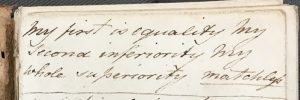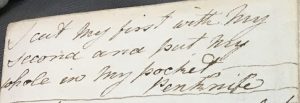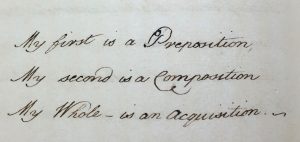By Leehu Sigler
Timeless Riddles is a ROAAr project dedicated to transcribing, solving, and researching riddles found in early manuscripts! Help us solve them all!
“It is one thing…to have very good sense in a common way, like every body else, and if there is any thing to say, to sit down and write a letter, and say just what you must, in a short way; and another, to write verses and charades like this.”[1] – Emma, Jane Austen
On today’s menu are the baffling Enigma and the scrumptious Charade – both kinds of Riddle.
An Enigma, as its name implies, is a slightly more complicated Riddle.
Enigmas are riddles – but in poetry form! Check this one out:
Learning has bred me – Yet I know not a letter
I have liv’d among books – Yet am never the better
I have eaten up the muses – Yet know not a Verse
What student is this – I pray you rehearse.
See how it rhymes? That’s what makes it an Enigma! The answer to this one is ‘worm’.
Another type of riddle we have at Timeless Riddles is the Charade. Charades are similar to the game of charades we play today. In fact, the modern game evolved from the written version[2].
This type of riddle first breaks the solution into parts, the last clue hints at the whole word, which includes the first answers combined. Here’s an example:
My second inferiority (less)
My whole superiority (matchless)
Two more Charades for practice:
second and put my
whole in my pocket.
The answer to the first Charade is ‘penknife’. You cut your ‘pen’ (first syllable) with your ‘knife’ (second syllable), and can put the ‘penknife’ (whole word) in your pocket!
My first quite uncivil is often
times reckon’d,
a name for each creature
on earth is my second,
my whole when united so
odd will appear
the coward will fight me,
the hero will fear.
The answer to the second is ‘nothing’. ‘No’ (first syllable) is considered uncivil, a name for each creature is ‘thing’ (second syllable), and the coward will fight ‘nothing’, just as the hero will fear ‘nothing’ (whole word)!
Did you get them both? Now that you have all gotten the hang of it, try these on your own:
One Enigma:
A Riddle of riddles, it dances & skips
It is seen thro’ the eyes tho’ it cheats by the Lips.
It never is seen, but often is read
It is sometimes a feather, & sometimes ‘tis Lead.
If it meets with its Fellow – its happily caught
But if money can buy it-its not worth a groat.
And one Charade:
My second is a Composition
My Whole – is an acquisition.
Can you solve them? Tune in next time for the answers and more Timeless Riddles!
Check us out on Facebook @timelessriddles, follow us on Twitter @Time1essRiddles, or shoot us an email at timelessriddles@gmail.com to solve riddles, ask questions, or just to stay involved!
Don’t forget to follow @McGillLib, @McGill_ROAAr, and @CookeNathalie on Twitter as well, without which this project would not be possible.
Keep calm and riddle on!
[1] Jane Austen, Emma (Project Gutenberg, 2010) http://www.gutenberg.org/files/158/158-h/158-h.htm
[2] Pg. 24 Tony Augarde, The Oxford Guide to Word Games. (Oxford: Oxford UP, 1984)















Leave a Reply
You must be logged in to post a comment.